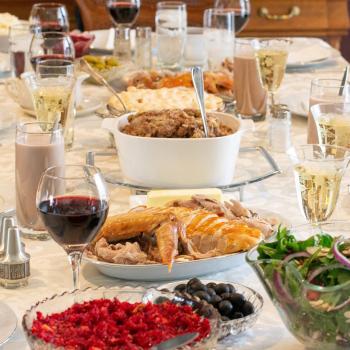My parents homeschooled me in part to “shelter” me – to keep me from what they considered “bad influences.” They carefully monitored what movies we watched, who we were friends with, what we read and learned, and where we went or what we saw. The goal was to raise us to share their beliefs, unadulterated by potential corruption from ideas and beliefs they considered “wrong.”
Having been raised this way, I have to avoid falling into the same pattern. Sometimes it’s tempting to think that I need to shield Sally from any mention of God or religion, to “shelter” her from the theistic beliefs I personally believe to be “wrong.” Except that while my parents’ goal was to raise a Christian daughter, my goal is not to raise an atheist daughter. My goal is to raise a daughter who is open minded, a critical thinker, and able to choose for herself what she believes. And that, quite simply, is why I’m not afraid of baby Jesus.
My goal as a parent is not to close Sally’s mind, it’s to open it. I will never tell her what to believe. I will tell her what I believe, and that she will need to choose her own beliefs. And in that vein, I plan to expose her to a variety of different religious traditions. We will read books about world religions, learn the mythology of different religions past and present, and probably even visit different houses of worship. We will go to international festivals and learn about different people groups’ traditions and beliefs.
The other day Sally and I passed a large manger scene display in a store. She asked what it was, and I told her, quickly because we were in a hurry, that it was a manger scene. In the future I’ll tell her that the manger scene is part of a story some people believe about Christmas, a story about a special baby born in a barn and shepherds and kings who came to visit him. Children hear many stories: Jack and the beanstalk, Thomas the tank engine, Harry Potter, Peter Rabbit, etc. Similarly, every religion has its own stories, its own mythology. I’m not going to shield her from the stories, I’m just not going to tell her they’re real.
Have you ever noticed that if you hide something from kids, they’re suddenly especially interested in it? Sex, for instance. The more you try to hide it, the more kids are curious. And so, even if I wanted to shelter Sally from any mention of religion – which I don’t – it would probably backfire. Suddenly religion would be this really fascinating thing because it’s forbidden. If I forever whisked her away from manger scenes and refused to answer her questions in an attempt to keep her ignorant of them, she would almost certainly become more fascinated and more determined to learn about this thing her mommy is hiding.
The truth is, we live in a nation where the vast, vast majority of people are religious, and the vast, vast majority of them are Christian. Sally will come in contact with religion in all sorts of ways as she grows up, and that’s not a problem. But because of this I would argue that in order to function well in our very religious world some degree of religious literacy is necessary. If I want Sally to be able to understand those around her, whether Christian or Muslim or Jewish or what have you, she needs to have some understanding and knowledge of religion.
I will teach Sally about the various traditions that surround Christmas, both religious and secular, and, yes, pagan. We will delve into the history and the richness of tradition. I love the ways in which holiday celebrations tie us to our forebears through common practice and common custom. If I lived in a Muslim country, I would teach Sally the history and roots of Ramadan, or if we lived in Israel I would do the same with Purim, etc. And actually, I’ll probably teach her about those religious holidays as well even as I teach her about the history, beliefs, and traditions of different religions. We already have one picture book on world religions, and we will purchase more as time goes on. We may even make crafts or foods based on these holidays, or try out some of their traditions just for fun. It’s the same with Christmas.
I don’t yet have a lot of experience with explaining different religions or religious traditions to Sally, because she’s still young. I don’t think she has a concept of “god” yet. As time goes on, though, I anticipate using the phrase “some people believe” a lot. “Some people believe that the world was made by an all powerful being they call ‘God.'” And so on. When it comes to Christmas, I will need to explain that “some people believe that an all powerful being they call ‘God’ had a son, and this son became a human being and was born on earth two thousand years ago, and they celebrate his birthday on Christmas.” Then, if she asks what I think, I’ll tell her that I think it’s just a story.
Am I worried about this confusing her? Not really. The “some people believe” line won’t just be used to tell Sally about what Christians believe, but also what Muslims, Jews, or Hindus believe. We’ll read loads of religious mythology, from the ancient Roman mythology to Hindu mythology to Catholic stories of saints’ lives. My goal is for Sally to learn about the different religious traditions in a way that avoids giving any one of them special footing. There are many religions, many religious holidays, and many religious mythologies. And from there, Sally can make up her own mind.
The Christmas season, then, serves as an occasion to learn about Christian traditions, history, and beliefs. Given that Hanukkah occurs around the same time, it can serve as a similar impetus for learning about Jewish traditions, history, and beliefs. And given the holiday atmosphere in general and the time out of school, it might be an excellent time to learn about religious holidays in general. I’m not opposed to letting Sally make an advent calendar if she wants to any more than I am opposed to letting her play the traditional Hanukkah Driedel game. The holidays, then, can serve as a time for religious education rather than religious indoctrination.














